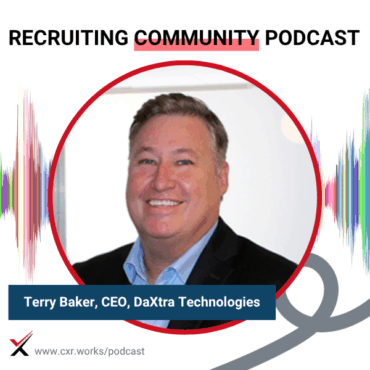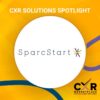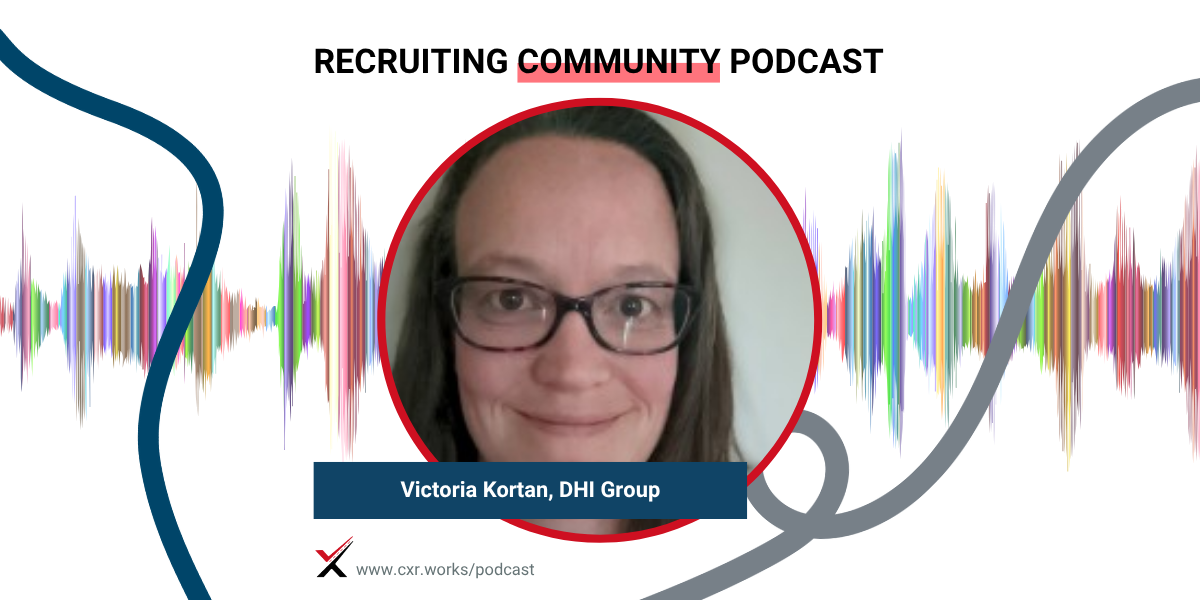
The Challenge of AI-Powered Solutions
Can AI improve recruiter decisions without replacing them? Terry Baker explains how better data and transparency are making AI a true talent partner.
 play_arrow
play_arrow
Solutions Spotlight on SparcStart Cami Grace
 play_arrow
play_arrow
From Operations to Coaching: Lori Chartrand’s Career Crossroads Cami Grace
 play_arrow
play_arrow
Beyond ‘Don’t Do X’: Compliance as Problem-Solving Cami Grace
 play_arrow
play_arrow
Career Crossroads: A New Series from the CXR Team Cami Grace

Episode Overview:
This episode delves into the rapidly evolving field of AI and its integration into workplace practices. The discussion pivots around leveraging AI for internal support, improving customer understanding, and enhancing product features. The creation of a Center of Excellence (CoE) is highlighted, illustrating its role in democratizing AI knowledge and tools across various organizational departments.
Key Topics Covered:
Challenges of AI-Powered Solutions:
Challenges of AI-Powered Solutions: Terry discusses the difficulties faced by HR leaders who have limited experience with AI applications, emphasizing the need for vendors to demonstrate the technology’s ROI and ease of integration.
Data Quality and AI Performance:
The impact of data quality on AI’s effectiveness was a major focus, highlighting how poor data can lead to less effective AI outcomes.
Ethical Considerations and Bias in AI:
The conversation also explored the ethical implications of AI in recruitment, particularly around data privacy and the potential for bias, emphasizing the importance of transparency in AI algorithms.
Closing Notes:
This episode not only sheds light on the technical aspects of AI in recruitment but also humanizes the discussion, making it accessible and engaging for professionals across all levels of expertise. The sessions wraps up with gratitude to Terry Baker for his contributions and tease future engagements that promise to delve deeper into the intersections of AI and human resource management. The emphasis is on the continuous learning and adaptation required to leverage AI effectively in improving recruitment outcomes.
Title:
Create an AI Culture
Featured Guests:
Victoria Kortan, Senior Machine Learning Engineer, DHI Group
Hosts:
Chris Hoyt, President, CareerXroads
Gerry Crispin, Principal & Co-founder, CareerXroads
Episode Overview:
Victoria Kortan joins the podcast to discuss her work leading an AI Center of Excellence at DHI Group. She shares her experiences navigating rapid advancements in AI, fostering organizational learning, and building a culture where exploration, safety, and cross-functional collaboration are key. The discussion includes practical examples of AI upskilling, project incubation, and accessible AI culture-building.
Key Topics:
History of job boards and DHI’s evolution from a bulletin board to a digital platform
Characteristics of a healthy AI culture
Democratizing access to AI tools and education
Addressing bias, fairness, and AI ethics
Prompt engineering and iterative learning
Strategies for team and company-wide upskilling
Innovation time and employee-led AI projects
Center of Excellence goals and internal/external AI initiatives
Notable Quotes:
“AI shouldn’t feel like it’s only for the elite. Everyone should feel empowered to use it.” —Victoria Kortan
“You get brilliance and nonsense—it’s all in there.” —Victoria Kortan
“It’s like working with a shiny new intern—eager, not an expert, but has Google at their fingertips.” —Chris Hoyt
“We don’t have millions to throw at AI teams, so we try to scale what we have.” —Victoria Kortan
“You don’t have to be a genius to do cool AI stuff.” —Victoria Kortan
Takeaways:
A strong AI culture is rooted in accessibility, continuous learning, and ethical responsibility. Victoria Kortan emphasizes the importance of empowering employees through upskilling opportunities, cross-team collaboration, and time for independent exploration. Her team’s Center of Excellence demonstrates how scalable, inclusive approaches to AI can drive both internal and external impact.
Want more conversations like this?
Subscribe to the CXR podcast and explore how top talent leaders are shaping the future of recruiting. Learn more about the CareerXroads community at cxr.works.
Chris Hoyt: So I just turned it on. Jerry just asked a great question, which I wanted to capture because we talked about this recently. We had a quiz activity at one of our last meetings, and Jerry, I think you’ve got a great question here.
Gerry Crispin: That’s right—and no one knew the answer. They all got it wrong. We were trying to teach a little bit of history, and someone asked: What is the earliest job board on the internet?
Now, there was one that actually preceded the internet—it was a bulletin board. Most people in the room had no idea what a bulletin board even was. But DHI (Dice) was out there as a bulletin board. You had to use your computer and a phone to connect to a server that Dice operated to see job postings. I don’t think it was the first bulletin board job board, but it’s the only one that transitioned to the internet and still exists today—albeit in a very different form. Fascinating stuff.
Chris Hoyt: Yeah, it’s a great little tidbit of history. And I think it’s kind of funny—ten years ago when we started working more closely together, people would ask questions and you’d say, “I’m starting to feel a little older than everyone in the room.” And now, here we are ten years later, and I’m starting to say, “I remember that!” Oh man, I’m feeling older now too.
Gerry Crispin: Absolutely.
Chris Hoyt: Alright, Victoria, are you ready to get started?
Victoria Kortan: Sure, let’s do it.
Announcer: Welcome to the CXR Channel—our premier podcast for talent acquisition and talent management. Listen in as the CXR community discusses a wide range of topics focused on attracting, engaging, and retaining the best talent. We’re glad you’re here.
Chris Hoyt: I’m excited to be here today—welcome to the Recruiting Community Podcast. We do weekly insights and updates in the form of casual conversations. My name is Ben—and my partner in crime today is…
Gerry Crispin: Hi Jerry.
Chris Hoyt: Ben and Jerry!
Victoria Kortan: That’s good!
Chris Hoyt: Of course. How are you this morning, Jerry? I haven’t talked to you since you got back from the breakfast concert.
Gerry Crispin: I’m still processing it. It was one of the more unique venues for recruiters, and I think the openness of that venue contributes to folks having a really good time.
Chris Hoyt: I heard nothing but good things. Congrats to Jamie and the whole team—it sounds like it was a great event. And I heard they even dodged the weather, which was a bonus.
Alright—let’s talk about today’s show. Joining us is Victoria Kortan. She’s an experienced machine learning engineer and a leader in building an AI Center of Excellence. Today she’ll talk to us about navigating the AI boom, its impact on her career, and how she’s pushing for growth by supporting upskilling, collaboration, and independent projects within her organization.
Before we dive in, just a few housekeeping things—this is an ad-free labor of love. Nobody pays to be here or to give their opinions. We’re streaming live on YouTube, Facebook, LinkedIn, and Twitch. If you’re on LinkedIn, say hello in the chat.
Also, check out the CXR Marketplace at cxr.works/marketplace. Built by and for the CXR community, it’s home to over 7,000 ratings for more than 400 TA vendors. It’s now open to non-members too.
Gerry Crispin: Shoutout to Ron Thomas, calling in from Vienna!
Chris Hoyt: Let’s bring Victoria into the spotlight. Victoria, how are you?
Victoria Kortan: I’m good—it’s a nice day. I’m currently just south of Denver, at one of our offices. I live close by, so it’s easy to pop in.
Chris Hoyt: Great! I’ve got your LinkedIn profile up—you’re a Senior Machine Learning Engineer at DHI Group. You’ve been there just over a year. Before that, six years at Pearson, and you were a Data Science Fellow at Galvanize back in 2016. You’ve been in this space for a while.
For those who haven’t met you, can you give us a quick elevator pitch—who is Victoria Kortan?
Victoria Kortan: Sure. Professionally, I’ve been in this field for a while, picking up different skills—not just building models, but figuring out how to apply them in business contexts, which is a whole other challenge. It’s not just about building something cool—it’s about getting it into people’s hands and making it useful.
Unprofessionally, I’m a mom. I play ultimate Frisbee—that’s my thing.
Chris Hoyt: Is that like Frisbee golf?
Victoria Kortan: No—ultimate Frisbee is kind of a mix between football, soccer, and Frisbee. You score in end zones, you can’t run with the Frisbee—you have to throw it.
Chris Hoyt: Love it. Alright, let’s jump into the fun part. We always start with a dad joke. Victoria, you want to go first?
Victoria Kortan: Sure! Pirate-themed today:
Where do pirates keep their armies? — In their sleevies.
Where do pirates buy their hooks? — At the secondhand store.
Chris Hoyt: Oh no—that’s bad.
Gerry Crispin: I’ve got one. Why is 10 + 10 the same as 11 + 11? Because 10 + 10 is 20 and 11 + 11 is 22.
Chris Hoyt: Okay, I’ve got two:
What do you get when you cross a robot with a tractor? A trans-farmer.
What do AI engineers do at lunchtime? They grab a byte.
Alright—let’s jump in. Victoria, what makes a great AI culture?
Victoria Kortan: First, people need to feel like it’s accessible. AI shouldn’t feel like it’s only for the elite. Everyone should feel empowered to use it, explore it, and ask questions about it.
Second, give people tools to learn—whether it’s tutorials, internal experts, or resources to play and try things out.
Third, be responsible. Think about bias, fairness, and whether the AI is doing good or harm. Ask questions about what data it’s trained on, and how it affects people.
Chris Hoyt: I love that. It reminds me—email used to be locked down. Not everyone had access. Same with social media. AI started that way, but it feels like organizations are realizing they can’t just lock it up anymore.
Gerry Crispin: Right. It’s also about access to the right tools. With email, not everyone even had a computer. Now, with AI, the tools are more available—but there’s still a learning curve. Even now, phones are asking if you want an AI assistant constantly listening.
Chris Hoyt: I was looking at getting a new phone last night, and it was offering unlimited Gemini AI access. I laughed—it’s already listening all the time. Might as well be honest about it!
So Victoria, back to you. With the pace of AI advancement, how do you stay current?
Victoria Kortan: It’s tough. I email myself articles I want to read—but they pile up. I do a lot of catching up through newsfeeds and headlines. I have three kids, two dogs, and two cats, so time is limited. But at work, we do a lot of crowdsourcing—sharing cool new things with each other.
Chris Hoyt: There’s also a growing trend of using AI to summarize content or unread emails, right?
Gerry Crispin: Prompt engineering is another area where we need to learn. Iterative prompting is a skill—and knowing how the model works gives you an edge.
Victoria Kortan: Absolutely. Anyone can write a prompt, but understanding how the model processes language really helps.
Chris Hoyt: It’s like working with a shiny new intern—eager, not an expert, but has Google at their fingertips. Sometimes they say things that sound great, but they’re just confidently wrong.
Victoria Kortan: Yep. A chat interface with access to the internet. You get brilliance and nonsense—it’s all in there.
Chris Hoyt: So what kind of upskilling do you offer your team?
Victoria Kortan: For our team, we do trainings, go to conferences, and have internal “paper clubs” to review new research. But for the broader company, we launched a Center of Excellence to promote engagement, empowerment, and excellence.
We want to help people get started, feel confident, and be safe. Then we help them think about use cases and what to explore.
Chris Hoyt: And do you promote cross-team collaboration?
Victoria Kortan: Yes—it’s constantly evolving. We don’t have millions to throw at AI teams, so we try to scale what we have. We hold open sessions for anyone to bring questions. We’ve had people from all corners of the business reach out. We try to facilitate and support them.
Chris Hoyt: Are team members encouraged to take on independent projects?
Victoria Kortan: Definitely. We have “innovation time” where folks can explore whatever they want. Some really cool projects have come out of that—ones we actually use in our products.
Chris Hoyt: What kinds of outputs do you expect to come from the COE?
Victoria Kortan: Internally, we want to better support sales—help them understand customers more deeply. Externally, we’re hoping to improve our search functionality through AI features.
Chris Hoyt: Alright, final question—if you were going to write a book about this, what would the title be?
Victoria Kortan: Hmm. Maybe: “You Don’t Have to Be a Genius to Do Cool AI Stuff.”
Chris Hoyt: Love it. And who would you give the first signed copy to?
Victoria Kortan: My eldest daughter. She’s 10. I want her to embrace this early—and think critically too.
Chris Hoyt: Love that. Alright, last backup dad joke before we wrap: Why was the chatbot cold at work? Because it left its Windows open.
Victoria Kortan: That’s so bad. So bad it’s good.
Chris Hoyt: Victoria, you’ve been a wonderful guest. Thank you so much for joining us today!
Victoria Kortan: Thanks for having me. This was fun.
Chris Hoyt: Don’t forget—we do this every week (unless we’re on the road). You can catch all past episodes at cxr.works/podcast. See you next time, everyone!
Announcer: Thanks for listening to the CXR Channel. Please subscribe to CXR on your favorite podcast platform and leave us a review while you’re at it. Learn more at cxr.works or find us on Facebook, Twitter, and Instagram. We’ll catch you next time.
Tagged as: AI Center of Excellence, employee engagement, AI culture, Artificial Intelligence, ultimate Frisbee, Leadership, Digital Transformation, innovation time, Technology, Company Culture, Pearson, AI, Change Management, Podcast, DHI Group, machine learning, upskilling, Galvanize, prompt engineering.
Chris Hoyt is the President of CareerXroads, a global peer community for talent acquisition leaders driving strategic change. With decades of experience leading recruiting innovation at Fortune 500 companies, Chris now advises enterprise TA teams on tech, process, and leadership. He’s a frequent speaker at conferences like SHRM, HR Tech, LinkedIn, and UNLEASH, and he’s known for pushing conversations beyond buzzwords to get to what really works in hiring. Through CXR, he connects top TA professionals to solve real problems, challenge norms, and shape the future of recruiting.

Can AI improve recruiter decisions without replacing them? Terry Baker explains how better data and transparency are making AI a true talent partner.

